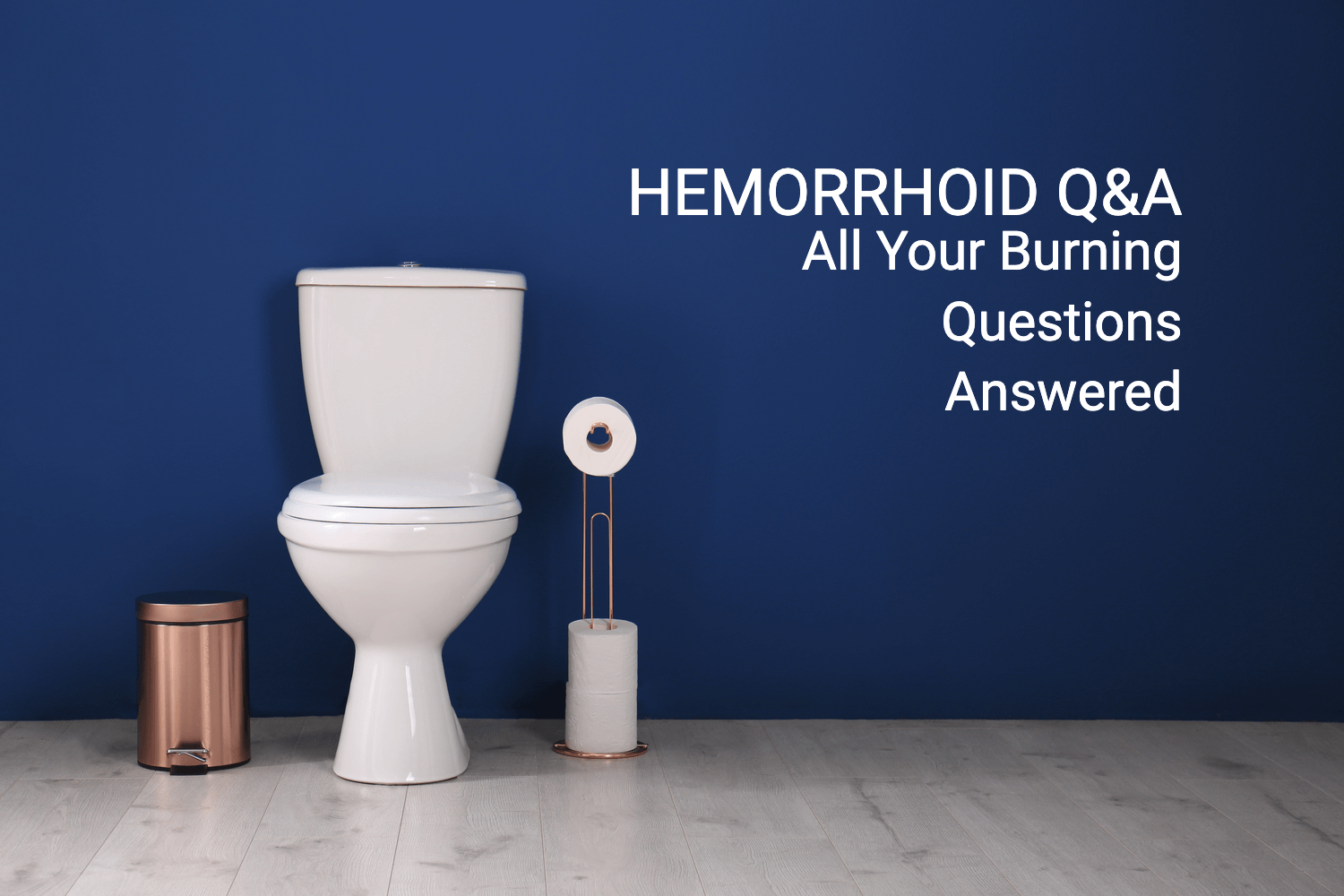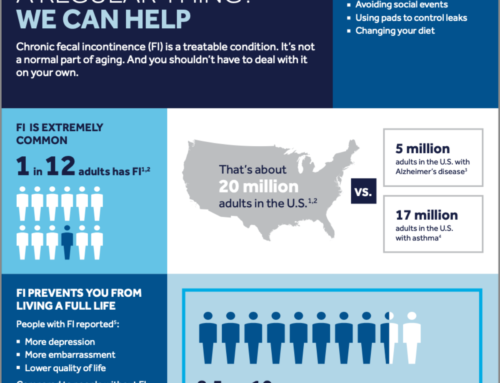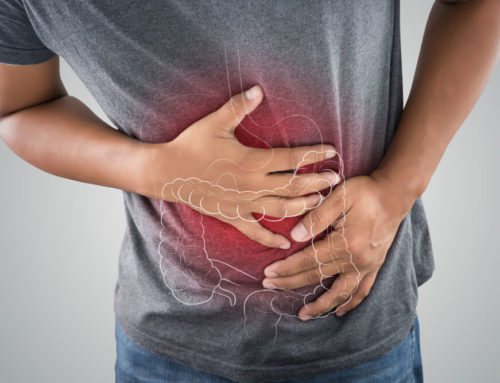Hemorrhoids are something you don’t hear talked about much in polite conversation. But it’s not because people don’t experience the burning, pain and itching that goes along with the condition. In fact, hemorrhoids are extremely common – with an estimated 75% of people experiencing hemorrhoid symptoms at some point in their lives. Yet only a small fraction of that number seek care for hemorrhoid symptoms from their doctor.
As you get closer to age 50, the likelihood that you’ll develop the condition increases. Read on to learn about hemorrhoid symptoms, causes, treatments and ways to avoid them altogether!

Q: What do hemorrhoids feel like?
A: Hemorrhoids are very common. Symptoms of hemorrhoids cause irritation, pain and/or extreme itching around the anus. There can be itchy or painful lumps or swelling, along with fecal leakage, painful bowel movements and blood after a bowel movement. If you’re living with some or all of these irritations, you’re not alone – a surprising number of people are suffering. Around 1 in 20 Americans have the condition, and your risk increases as you grow older. And according to the National Institute of Diabetes and Digestive and Kidney Diseases, nearly half of people age 50 or better are living with this painful problem.
Q: Is there more than one kind of hemorrhoids?
There are two key types of hemorrhoids – internal and external. Internal hemorrhoids are inside the anal canal, and external hemorrhoids occur right at the anal opening. Internal hemorrhoids are far enough inside your body that you usually can’t see or feel them, and bleeding might be the only sign you have them. They don’t cause much pain because there are few pain-sensing nerves inside the rectum.
External hemorrhoids are covered in skin around the anus, and there are many more pain-sensing nerves in this area. That’s why they hurt in addition to bleeding. Sometimes hemorrhoids can prolapse (or get bigger and come out of the anus). This type is more likely to hurt, especially when you have a bowel movement. Prolapsed hemorrhoids frequently go away on their own. If they don’t, they can often be pushed back into place.
Q: What causes hemorrhoids?
A: You might be wondering what causes hemorrhoids. Inactivity and not getting enough fiber are two habits that make people more prone to developing hemorrhoids. If your parents had hemorrhoids, you’re more likely to have them too. In general, hemorrhoids are triggered by swelling – when the pressure in your lower rectum affects blood flow, making the veins swell. The swelling can be caused by several factors:
- Obesity
- Pregnancy and childbirth
- Standing or sitting for long periods of time
- Holding your breath while lifting something heavy, or staining when you do something that’s physically difficult
- Eating a low-fiber diet
- Chronic constipation or diarrhea
- Pushing during bowel movements or straining on the toilet
Sneezing, coughing and vomiting can also make hemorrhoids worse. Understanding the cause of your hemorrhoids is important for prevention in the future.
Q: Are hemorrhoids dangerous?
A: We’ve painted a bleak picture of hemorrhoids, and they can be pretty miserable. But there is an upside! Hemorrhoids aren’t likely to cause you any direct harm. Only when you have excessive bleeding (which happens in rare cases) that leads to anemia, are hemorrhoids a cause of serious concern.
But that doesn’t mean you shouldn’t talk with your doctor. Because you can’t see for sure if internal hemorrhoids are the cause of bleeding, people with blood in their stool or new bleeding should share this information with a healthcare professional in case it is something more serious. So skip the urge to grab an over-the-counter treatment and ignore the pain. One thing you can do to bring quick relief: soak in a warm bath to soothe irritation. Wiping with witch hazel may also help.
Q: How can I keep this from happening to me?
A: Take a look at your toilet habits. If you’re spending long periods of time reading or playing on your phone while you’re on the toilet, this little habit could be bad for your bottom. When you’re on the toilet, your cheeks are spread causing pressure to increase on anal tissue.
People with constipation often fall into this trap – they sit and strain for long periods of time trying to get bowels to move. The best way to get things going again is to stay hydrated and eat enough fiber. Fiber helps water bind to stool, making it softer and allowing it to pass without trauma. You can meet your daily fiber needs with a fiber supplement or by incorporating foods like oatmeal, prunes, beans, nuts, apples, spinach, and kiwi into your diet.
Other simple tips to keep hemorrhoids at bay include:
- drinking plenty of water to fight constipation.
- elevating your feet with a stool while on the toilet, allows your body to be at a better angle for passing bowel movements more easily.
- quickly using the bathroom when nature calls
- soaking in warm water or a sitz bath will help sooth sore anal tissues
- using topical treatments or over-the-counter wipes like Preparation H to ease the pain and reduce swelling
Get Help Treating Your Hemorrhoids
If you’ve tried over the counter methods for hemorrhoids and symptoms are still lingering, help is available. Although rare, serious hemorrhoids may need to be removed. Surgeons use a number of simple techniques to address the problem, and it’s important to thoroughly discuss all your treatment options. The colorectal surgery experts at University Surgical have vast experience in treating all types of colorectal conditions and can help you find the relief you need. For more information, call (423) 267-0466.







I like how you shared that one of the factors that cause hemorrhoids is the long periods of sitting in the toilet as the cheeks are spread, which causes pressure on the anal tissue.
We heard about cases like these from our science class and want to ensure we know how to prevent them. I’m glad I came across your article and learned the reason and cause of this illness.
I will surely share this with my friends and see how it helps.
It really helped when you described why hemorrhoids are caused and how they’d be treated. Recently, my mom told me she thinks she might have hemorrhoids and is worried about going to get checked, so I’ll make sure she reads your tips right now. Thanks for the information on avoiding spending too much time standing up or sitting down to prevent hemorrhoids.
Thank you for sharing the different hemorrhoid grades and their symptoms in your post. I have had blood in my stool since last week and am planning to see a doctor for internal hemorrhoid treatment. I call my symptoms hemorrhoids.
Hemorrhoids, also known as piles, are swollen blood vessels located in the rectum or anus. They can be caused by various factors, including straining during bowel movements, chronic constipation or diarrhea, pregnancy, and obesity. Hemorrhoids can be painful and may lead to symptoms such as bleeding, itching, and discomfort. Treatment options include lifestyle changes, dietary modifications, over-the-counter medications, and in severe cases, medical procedures like rubber band ligation or surgical removal. If you’re experiencing symptoms of hemorrhoids, it’s advisable to consult a healthcare professional for proper diagnosis and guidance on treatment.
Interesting insights on frequently asked questions about hemorrhoids.